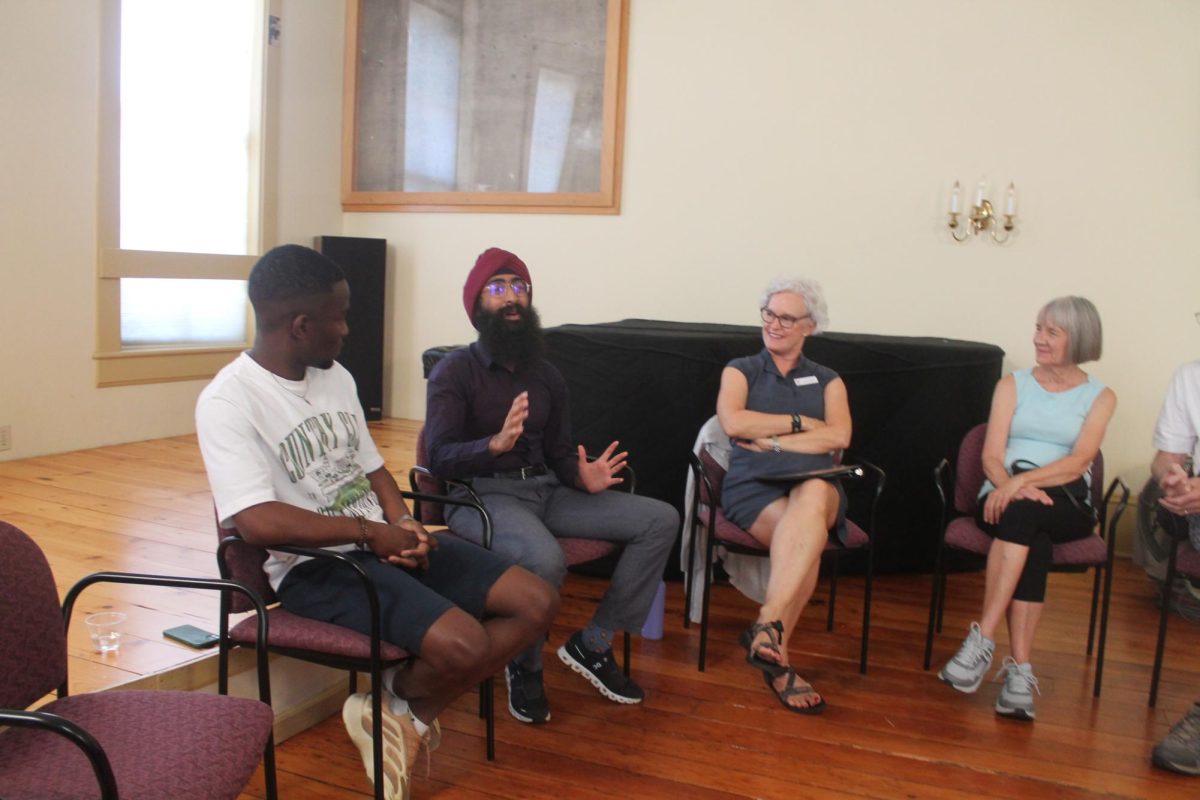JJ Kapur and Joshua Musonda presented their stories as part of a CultureAll Open Book event at Lisbon Library’s Heritage Hall Wednesday, Aug. 28. The program was supported by a grant from Humanities Iowa to bring this presentation to adults.
Karen Downing, director of CultureAll, said that there are a total of 53 books featuring the stories of Iowans from diverse backgrounds. As part of the presentation, Augustin and Kapur would share their stories and then leave a question for participants to springboard their own connections and stories from the piece.
Musonda’s story focused on his dislike of the cold weather. Musonda, who grew up in South Africa, said that for him, temperatures that were negative 2 Celsius (roughly 25 degrees Fahrenheit) were the winter temperatures he was used to, and even that was challenging for his body to endure.
“Despite the number of layers you put on in those temperatures, the cold always has a way of finding it’s way to you,” Musonda said.
He remembers when they first came to the United States, a family of seven, and experi- enced their first winter. Their first solution when dealing with these cold temperatures was having indi- vidual electrical heaters that would operate in the winter.
That led to the family shorting their elec- tricity in their house because it overloaded the circuits the heaters were plugged into.
“Not only were we freezing, but now we were left in the dark, too, while we figured out how to fix this,” Musonda said.
The next solution was utilizing hot water bottles before going to bed at night to pro- vide warmth in the winter months.
“The issue is you would have these hot water bottles and every few weeks of use of pouring in this extremely hot water, you’d have bottles that would break,” Musonda said. “Then she’d have all of these kids ask- ing about new hot water bottles, and those weren’t cheap.”
Musonda said they were privileged to live next to a neighbor from Bulgaria who told her own stories of hot bottles that were created when she was a young child that used glass bottles instead.
“That discussion stuck with my mom, and when she went home and was looking at the cupboards, she realized that we didn’t have glass bottles, but we had plenty of Tupperware bottles,” Musonda said.
It was an example of how his mother took something that was once useless and made it something useful. It’s a lesson he has carried into his own life as well. He’s used knifes as screwdrivers when he couldn’t find one of those, or used his running as a stress reliever, turning other items that might have been useless into something useful for himself.
Amy White recounted that growing up she and her family would do a lot of camping. At those campsites, there weren’t a lot of toys so items like stones and sticks became puppets or figures for playing.
JJ Kapur spoke about how he grew up an only child and his interactions with his father shaped his own love of learning and imagination.
“When I grew up, I grew up watching Bollywood movies with my parents,” Kapur said. “In those movies, the superheroes aren’t like the ones that are depicted from Marvel with big muscles or shooting web from their fingertips. They’re usually heroes who have pockets full of pixie dust.”
In his life, the closest example he had to a real life superhero was his father. Every day after his father would come home from work, the two would go to the basement which was their laboratory of play.
“Because I was an only child, my dad served as my big brother and sometimes drill sergeant,” Kapur said.
Kapur recounted that some of their lessons might be taking something that looked useless into something useful. In one case it was wrapping copper wire around a cardboard box and attaching a light to one end of the copper wire and then using a magnet that they would circle around the copper wire, that would turn the lightbulb on with kinetic energy.
“I’d later find out the term for this type of energy conduction is electromagnetic conduction, but at the time it was just mind blowing to see it work,” Kapur said.
Kapur recounted as he grew older, that basement stayed the same. During the pandemic, Kapur returned home and was now living in that basement.
Also during that pandemic, his father was interacting with being forced to work from home for the first time in a 30-year career.
“And mom and I noticed a change in dad with that working from home,” Kapur said. “His calls to family, that would sometimes have spanned hours, were lasting just a few minutes before he passed the phone on.”
Kapur said that looking at it now, he could see it was a textbook example of major depression.
“That definition in a textbook is the inabil- ity to experience joy,” Kapur said. “I viewed it more as my dad had lost the ability to play.”
Around the same time, Kapur was going through his own issues as well. He’d had a first relationship, first love and eventually first break-up. It was one of those nights after the break-up he asked his dad to sleep beside him, to reconnect with his father.
He recounted that night, his father sang one of the Sikh hymns over his son. Shortly after, his father found a remission from his depression as well. The question Kapur wanted people to explore was how people they held up as heroes were shown to be human to them.
Sandeep, a doctor in Iowa City, said his interactions with patients usually goes the other way. He sees them as human, tackling an illness and getting treated, but it’s walk- ing out to those waiting rooms that he sees how important that person is to a range of other people.
“There are no common men or women who step through our doors,” Sandeep said. “Many of them are heroes to their family and friends.”

